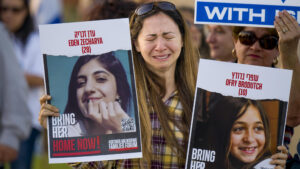“You’re all a bunch of feminists, and I hate feminists!” shouted Marc Lépine as he gunned down 14 female engineering students in Montreal in 1989. I first visited the city in 2012 to write about this particularly horrific, misogynistic massacre. And every time I return, I see the terrible toll that unbridled male violence takes on women and girls.
Justin Trudeau has been a disaster for women here. He has done nothing to stem the violence and abuse faced by indigenous women, has made single-sex shelters illegal while supporting the blanket decriminalisation of pimping, brothel-keeping and sex-buying — and all in the name of “freedom and choice for women”.
This makes their resistance here that more powerful. I see it in full view when I return for the World Congress for the Abolition of Prostitution and march alongside survivors of the sex trade. Women of all ages, all nationalities, march and shout in unison: “What do we want? An end to prostitution!” We are rowdy, blowing whistles and singing in the vibrant and colourful demonstration. Placards bearing slogans such as “No john is a good john”, and “Prostitution is bought and sold rape” jostle above the throng.
There is, inevitably, a counter-demonstration. Whenever sex-trade abolitionists gather, rival activists who consider prostitution a “choice” and a legitimate form of “work” turn up to shill for the pimps and punters. They refer to us as “carceral feminists” because we believe that the law should intervene to stop men from buying and selling sexual access to women and girls.
And so, a wall of mounted police is mustered to protect us from a group of women and men shouting through megaphones. Some of these protesters are draped in blue and pink trans flags, and many wear keffiyehs covering their faces. One man wears a T-shirt that reads: “No Swerfs, No Terfs”. Another, dressed in a tartan skirt, holds up a placard: “It’s pride month: fuck a tranny”; while a woman waves a sign which reads “Fuck TERFS”. There are shouts of “Real work sucks! Blowjobs are real jobs”, and “No room for whorephobia, no room for transphobia, terfs and swerfs”.
Then, I hear my name through the loud hailer: “The fact they invited Julie Bindel to speak says everything we need to know. She hates trans people and sex workers.” I’m not surprised. Wherever feminists gather to discuss the threat to women’s rights, the masked marauders show up.
It’s true there are key similarities between the movements promoting gender ideology and “sex work”. Both argue that they are motivated by liberation from oppression and stigma; both are fuelled by misogyny. Their arguments rely on sexual objectification, male supremacy, female subordination, and rigid stereotypes about masculinity and femininity.
Liberal advocates of prostitution counter that it is a liberatory practice and a sexual identity — a stance which allows them to piggyback on the lesbian and gay movement. No wonder one of the many flags covering the busy streets of downtown Montreal to celebrate Pride month is that of sex workers’ rights. But this stance ignores the toll both take on women’s rights and women’s lives — especially upon the most vulnerable, who do not have the luxury of liberatory freedom.
For standing up for these women, many of those who have gathered at the conference have been subject to abuse. Reem Alsalem, the UN Special Rapporteur on violence against women and girls, has been targeted by transactivists for arguing that it’s dangerous to allow trans-identified males in women-only spaces. In a recently published report on prostitution, she condemned the practice of men paying for sex. The backlash was swift and brutal: sex workers’ rights activists accused her of supporting the criminalisation of women in the sex trade, even though she has made it clear that she considers them innocent victims of sexual abuse. Alsalem is not an uncontroversial figure. She came in for harsh criticism following her comments on the 7 October pogrom perpetrated against Israeli citizens by Hamas. When questioned as to why the UN had not (at that time) made a statement condemning the atrocities, Alsalem said she had not seen enough evidence to prove the terrorist group had used systematic rape and other forms of sexual torture during the attack. She has, subsequently, condemned any and all of the sexual violence being perpetrated during the current war.
Alert to all instances of female oppression, Reem does recognise that the sex trade is “a situation of extreme violence, to which many women and girls are subjected [to] systematically across the world”. But she also pinpoints another, more political, problem: “the drive to decriminalise prostitution, and the drive to demonise the victims and others that speak out against its normalisation is part of an incredibly dangerous, large-scale offensive that is being launched right now by evolved patriarchy against the rights of women and girls”.
She’s right. While those promoting these ideas claim to be progressive, they are actually reinforcing rigid, antiquated, anti-woman stereotypes. Men who pay for sex believe that they have both a need and right to do so, and rarely take into account the women involved. The same could be said for those men who wish to enter female-only spaces. While prostituted women are required to conform to an image of extreme femininity, men claiming to be women wear the trappings of female oppression like a costume.
As Andrea Long Chu illustrates in Females, many trans-identified men seem to aspire to the worst kind of sexual objectification: “The “barest essentials” of “femaleness” are “an open mouth, an expectant asshole, blank, blank eyes”. Similarly, Paris Lees, the trans-identified journalist, wrote: “Last summer I went to Ibiza, where I was catcalled, sexually objectified and treated like a piece of meat by men the entire week. And it was absolutely awesome.”
This kind of language is incredibly damaging for feminism. It conveys the idea that all women enjoy being objectified. At the conference, Kimberly, a sex-trade survivor from Vancouver, reflects on the horrors of such objectification: “I was so tired of being treated like a piece of meat, each and every day. “It makes us feel subhuman.”
As in life, so with prostitution: it is the weakest and most vulnerable who suffer the most. If the West decides that prostitution is moral and acceptable, it will have a devastating impact on other women living in precarity around the globe. In countries such as Holland, Germany and Switzerland, all with legalised regimes, significantly higher numbers of men solicit sex for money. And, in order to meet the rise in demand that legislation incurs, women have to be trafficked in from other countries. They are being legally bought and sold as commodities — treated as subhuman.
This attitude is borne out in the way they are treated by punters. Women speak of the horrendous smell of the men, and the pain of being penetrated by a queue of them. They tell me about the horror of having his semen or other bodily fluids anywhere near their faces. The whiplash as they snap their head away as he tries to kiss them.
There are wider harms perpetrated by prostitution, such as the detrimental effect it has on women’s rights. The conference stood united in condemning so-called human rights organisations that claim selling sex is merely part of the economy. Sanitised language, such as “sex work”, is today used by the majority of police officers, media outlets and medical professionals. There are those who use the term “juvenile sex work” to describe sexually abused children. The term “forced sex work” has become widely used among some international non-governmental organisations (including, for example, Action Aid), which strikes me as an oxymoron.
By its very nature, prostitution is a cause and a consequence of women’s oppression by men. It is the driver for sex trafficking, and a hugely profitable trade in which money is made from the commodification of human beings, mostly women and girls.
The march through the city of Montreal on the first day of the conference was led by some of the bravest women I know — those who endured the hell of prostitution and lived not just to tell the tale, but to fight against the creeping influence of the pro-prostitution lobby, including those on the counter demo shouting about “blow jobs” being real jobs. These women stand tall against the wealthy and powerful pimp lobby, and without their voices and the resistance of those represented at the conference, we would be seeing far more countries introducing a legal model such as that in Holland.
The ever-present irony is that men would never dare campaign for their right to buy sex. In fact, they don’t need to: they get women to fight for prostitution on their behalf. Why do these men refuse to show their faces in support? Perhaps, it’s because they know exactly how sinister prostitution really is.
Disclaimer
Some of the posts we share are controversial and we do not necessarily agree with them in the whole extend. Sometimes we agree with the content or part of it but we do not agree with the narration or language. Nevertheless we find them somehow interesting, valuable and/or informative or we share them, because we strongly believe in freedom of speech, free press and journalism. We strongly encourage you to have a critical approach to all the content, do your own research and analysis to build your own opinion.
We would be glad to have your feedback.
Source: UnHerd Read the original article here: https://unherd.com/



